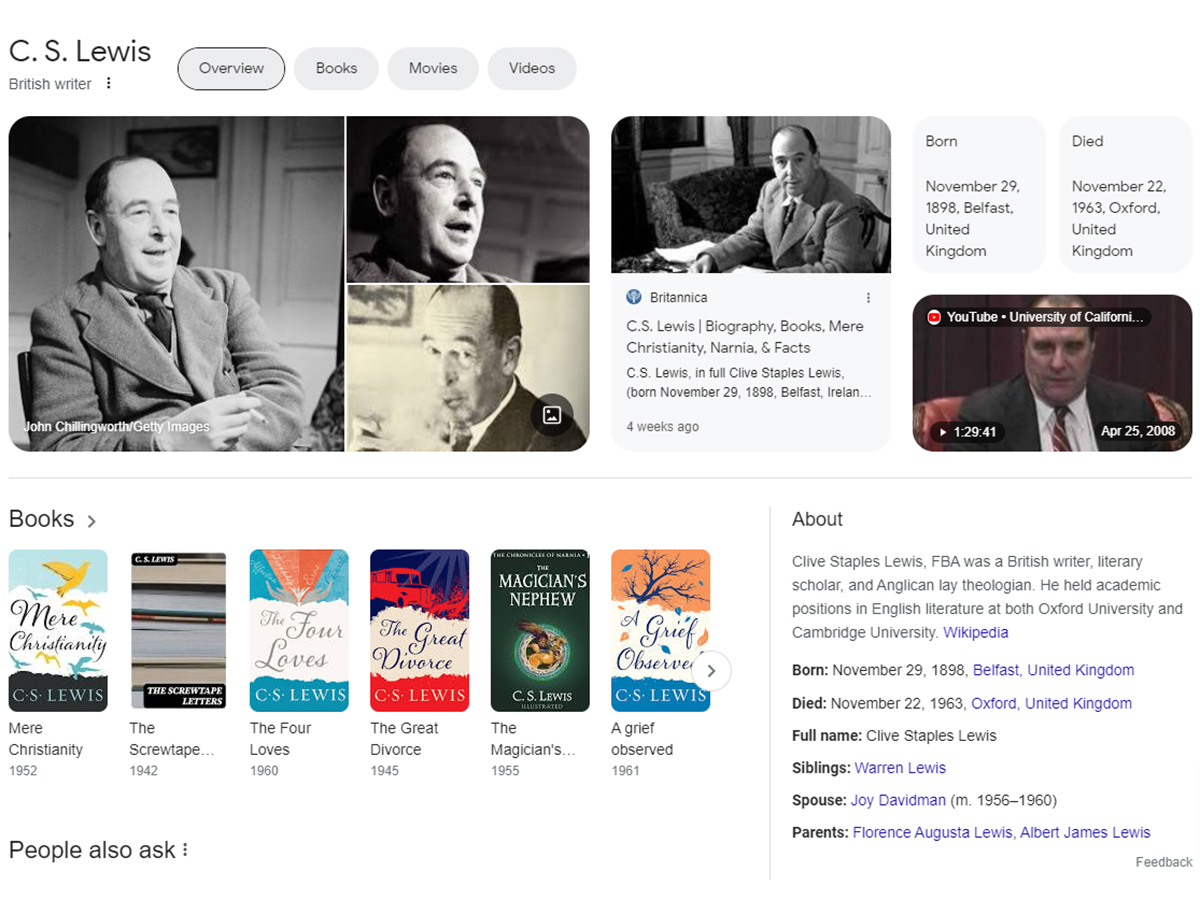What Is a Google Knowledge Panel?
A Google Knowledge Panel is a commanding search results feature that displays concise summarized information about an Entity. This may be a business, person, thing, or brand collected by Google. It is gathered and cataloged from various credible sources.
It is what Google understands of the facts about your Entity.
Once you obtain a Knowledge Panel, this means that Google has assessed your Entity and found it notable enough to present a comprehensive summary about it. This typically is a nice boost to building your online credibility and trust factors. This may include business partners, potential customers, or your current audiences – any who are researching your Entity.
The Knowledge Graph, a crucial component of Google’s search engine, is a knowledge base that enriches search results with semantic-search information from diverse sources. Introduced to Google’s search engine in 2012, initially in the United States, it was heralded on May 16, 2012. The Knowledge Graph not only offers structured and detailed information about a topic but also a list of links to other sites. Its primary aim is to empower users to resolve their queries without the need to navigate to other sites and gather information themselves.
Where does a Google Knowledge Panel appear?
The Knowledge Panel displays on the right side of search results on desktops and takes center stage within search results on mobile devices. This way, users immediately gain a comprehensive and convenient ‘overall view’ of your Entity. It says people time since they don’t need to perform multiple searches.
A Knowledge Panel displays in box format. It functions as a way for Google to concisely display the information it knows about your brand when people search for it. Google considers it to be very human-friendly, easy to understand, and has a clickable form. Your Google Knowledge Graph may have a question-answer feature that is ready made.
Since it’s People Also Search For (PASF) feature in popular, your KG may also contain this feature.
Who can get a Google Knowledge Panel?
Anyone can obtain a Google Knowledge Panel by taking the necessary steps. Google itself takes the action of creating a Knowledge Panel for entities it understands and believes are deserving of one. Currently, Google does not provide specific guidelines or limits. Rather, you will need to invest the time and work to provide the Google Knowledge Vault with the information it’d like.
Anyone who has gained Knowledge Panel on the Search Engine Results Page (SERP) can take this as a signal that Google is now only aware of your identity. Still, it also feels clear about your purpose, target audience, and where it may surface your content to someone’s benefit. Only after Google feels confident of the accuracy of your information will it create a Knowledge Panel that represents you. There is no cost for this.
What purpose does a Google Knowledge Panel serve?
While there is good reason to want to showcase your personal storefront or services, these knowledge panels were not created to serve the interests of the Entity they represent. Rather, they are meant to provide people who use Google Search to quickly obtain verified information that is helpful and relevant to the intent of their search queries.
It offers you a great way to showcase your content on the SERP.
How are Google’s Knowledge Panel and Google’s Knowledge Graph different?
Google’s Knowledge Graphis Google’s understanding of the world entities that it surfaces to queries. Google explains its Knowledge Graph as “our database of billions of facts about people, places, and things.” It relies on machine learning to read and assemble its Knowledge Graphs to display content that is findable on the Search Engine Results Page (SERP). This includes Knowledge Panels and, ultimately, its Knowledge Vault.
Once an Entity is in the Knowledge Vault, it typically already has a Knowledge Panel when a person queries that Entity on Google. This is logical, since a Knowledge Panel populates from the Knowledge Vault. Once you win your brand in this Vault, you can consider yourself future-proofed from future search changes. – Generative AI, Answer Engines and Assistive AI, as well as algorithms use the facts that Google has established in its Vault.
You can “feed” it information by using semantic triples in your web content.
